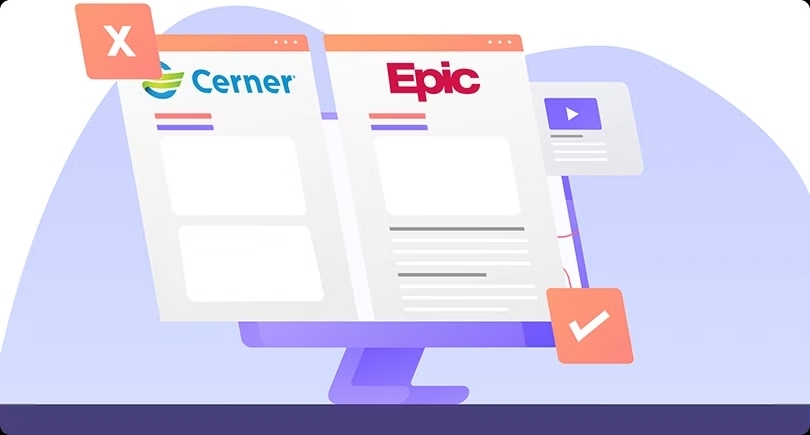Cerner vs. Epic EHR/EMR: Which path maximizes healthcare efficiency?

The ongoing digital transformation in the healthcare industry necessitates a thorough evaluation of Electronic Health Record (EHR) and Electronic Medical Record (EMR) systems. Two prominent players, Cerner and Epic, stand out with distinct features influencing the integration landscape. This article delves into integration capabilities, user experience, cost considerations, and decision-making factors of Cerner vs Epic for EHR/EMR integration.
Epic vs. Cerner: Exploring EHR/EMR Integration Approaches:
Integration Capabilities:
Cerner:
Cerner's commitment to an open architecture sets the stage for seamless integration with third-party applications. Cerner EMR system empowers healthcare organizations to create a customized ecosystem aligned with their unique needs.
Epic:
Despite following a closed system approach, Epic boasts an extensive in-house application suite that offers a comprehensive solution. This can potentially reduce the reliance on extensive third-party integrations.
User Experience and Interface:
Cerner:
Renowned for its intuitive design, Cerner provides healthcare professionals with a customizable interface. This flexibility enhances workflows, catering to diverse user preferences in the ongoing Cerner vs Epic debate.
Epic:
Epic stands out with a visually appealing and cohesive interface. The system's unified design ensures a consistent and streamlined user experience across various applications, emphasizing a standardized and visually pleasing interaction model.
Cost Considerations:
Cerner:
Positioning itself as a cost-effective solution, Cerner health systems are particularly beneficial for smaller healthcare organizations. The modular nature allows targeted investments based on specific needs.
Epic:
While requiring a substantial initial investment, Epic's comprehensive in-house suite may offset costs associated with external integrations, appealing to organizations valuing a unified solution.
What Factors Influence the Decision-Making Process Between Cerner and Epic Integration?
Integration Synergy:
Organizations prioritizing flexibility and interoperability may find Cerner more appealing in the Cerner vs. Epic integration decision. However, those seeking an all-in-one integrated suite might lean towards Epic.
User Preference:
In the comparison between Cerner EMR vs. Epic, healthcare professionals' preferences play a pivotal role. Cerner's adaptability and Epic's unified experience should align with user expectations.
Budget Allocation:
The decision between Cerner Epic involves evaluating the total cost of ownership, not just initial expenses. Considerations should extend to long-term maintenance and scalability, making Cerner's cost-effectiveness a decisive factor.
Cerner vs. Epic: Assessing User-Friendliness
Interface Appeal:
Cerner is known for its intuitive and customizable interface, allowing healthcare professionals flexibility in tailoring workflows. In contrast, Epic boasts a visually appealing and cohesive design, emphasizing a unified interface for consistency.
Training and Onboarding:
Cerner's approach involves customizable training programs tailored to specific roles, facilitating a smoother learning curve. Epic focuses on comprehensive and standardized training, ensuring a consistent onboarding experience.
Workflow Customization:
Cerner extends customizability beyond the interface, enabling healthcare organizations to tailor the system to match specific needs. Epic excels in a unified workflow approach, providing consistency but potentially posing a learning curve for users accustomed to customization.
User Feedback and Preferences:
User preferences often dictate the choice between Cerner and Epic. Cerner is favored by those valuing adaptability and customization, aligning with healthcare professionals seeking a more tailored experience. Epic's appeal lies in its uniform user experience, suitable for organizations prioritizing standardized workflows, particularly in larger healthcare settings.
Pros and cons of both Cerner and Epic in the context of EHR/EMR integration:
Cerner:
Pros:
Open Architecture: Cerner's commitment to an open architecture facilitates seamless integration with third-party applications, providing flexibility for customization based on specific organizational needs.
Adaptable Interface: Renowned for an intuitive design, Cerner offers a customizable interface. Healthcare professionals appreciate the flexibility to personalize workflows, enhancing overall efficiency.
Cons:
Potential Integration Challenges: While Cerner's open architecture is an advantage, it may pose challenges related to system harmonization and workflow adjustments during integration.
Limited In-House Suite: Cerner's reliance on third-party integrations may result in a less comprehensive in-house suite compared to Epic.
Epic:
Pros:
Unified User Experience: Epic stands out with a visually appealing and cohesive interface. The system's unified design ensures a consistent and streamlined user experience across various applications.
Regulatory Compliance: Epic's comprehensive suite is designed to ensure compliance with evolving healthcare regulations, providing a robust solution for organizations navigating regulatory changes.
Cons:
Limited Third-Party Integrations: Epic's closed system approach may limit external integrations, potentially reducing adaptability for organizations with diverse needs.
Higher Initial Investment: While Epic's suite is comprehensive, the substantial initial investment required may be a barrier for smaller healthcare organizations.
How do Cerner and Epic enhance workflow efficiency for healthcare professionals?
Cerner's intuitive design allows customizable workflows, providing flexibility for healthcare professionals to personalize their interface. Epic, with its visually appealing and cohesive interface, emphasizes a standardized interaction model. Epic Cerner ensures a consistent and streamlined user experience across various applications, contributing to enhanced workflow efficiency.
Conclusion:
In conclusion, the choice between Epic and Cerner for EHR/EMR integration is nuanced and depends on understanding the specific needs, preferences, and budget constraints of your healthcare organization. By carefully assessing Cerner integration vs Epic integration factors, you can make an informed decision aligned with your institution's goals, ultimately supporting efficient patient care.
- Industry
- Art
- Causes
- Crafts
- Dance
- Drinks
- Film
- Fitness
- Food
- Παιχνίδια
- Gardening
- Health
- Κεντρική Σελίδα
- Literature
- Music
- Networking
- άλλο
- Party
- Religion
- Shopping
- Sports
- Theater
- Wellness
- News


